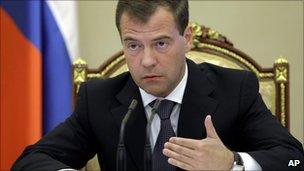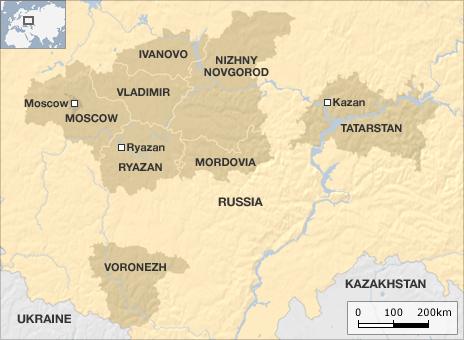Russia wildfires still spreading - 50 dead
- Published
Richard Galpin: "Twelve houses here have been completely destroyed"
Russia is still fighting to extinguish nearly 600 wildfires in an emergency that has now claimed 50 lives.
Foreign reinforcements are arriving, including two Canadair water-bombing planes from Italy. Ukraine and Belarus are also sending firefighters.
The defence ministry has ordered the transfer of all artillery and munitions from a military base near the capital.
The Moscow smog eased on Thursday, though an acrid smell persisted from peat fires burning outside the city.
Seven regions are under a state of emergency. Russian officials say there are now 589 wildfires raging across 196,000 ha (484,326 acres). More than 160,000 firefighters have been deployed.
Col Alexei Kuznetsov, a defence ministry spokesman, told the Associated Press that a garrison near Naro-Fominsk, 45 miles (70km) from Moscow, would be evacuated due to the danger posed by fires.
It was not in immediate danger, he added.
Radioactive worry
On Wednesday President Dmitry Medvedev sacked several top military officials for failing to stop wildfires from destroying a naval base outside Moscow.
He made the announcement after halting his summer holiday to return to Moscow for emergency talks on the wildfires.

Dmitry Medvedev fired officials for failing to stop fires from destroying a naval base
Emergencies Minister Sergei Shoigu has meanwhile warned that fires in the Bryansk region - an area affected by the 1986 Chernobyl disaster - could produce radioactive particles.
"In the event of a fire there, radionuclides could rise together with combustion particles, resulting in a new pollution zone," he was cited as saying on state television.
One fire earlier threatened a shelter housing some 1,000 animals in the Moscow area.
The Bim charity shelter at Khoteichi, 100km south-east of Moscow, said a forest fire had come dangerously close to the animals' cages.
It is home to hundreds of dogs and cats, as well as circus animals, RIA Novosti news agency reports.
No details were available on the number of animals killed in the wildfires, which have spread amid a record heatwave, with temperatures soaring to nearly 40C (104F).
Forecasters expect Moscow's high temperatures to persist for several more days.
Russia has announced it is banning the export of grain from 15 August to 31 December after drought and fires devastated about a fifth of its grain crop.
Homes lost
In the Nizhny Novgorod region, east of Moscow, firefighters have been battling blazes near a major nuclear research facility in Sarov.
As a precaution, all nuclear materials have been removed from the site, which is about 400km from Moscow.

More than 3,500 people have lost their homes in 14 regions of Russia in the past few days.
- Published5 August 2010
- Published4 August 2010
- Published4 August 2010
- Published3 August 2010